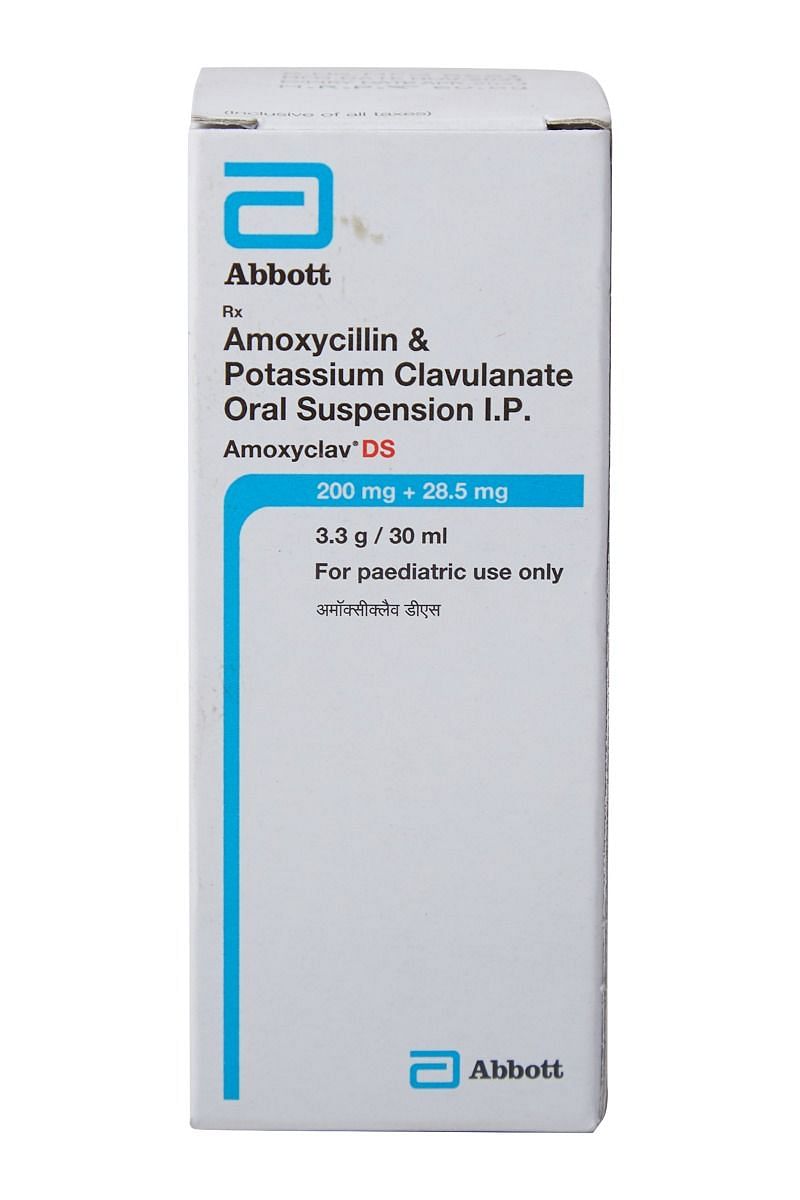
Avenclav Dry Syrup
Manufacturer
Aventura Healthcare Pvt Ltd
Salt Composition
Amoxycillin (200mg) + Clavulanic Acid (28.5mg)
Key Information
Short Description
Avenclav Dry Syrup is an antibiotic medicine that helps treat bacterial infections of the ear, nose, throat, chest, lungs, teeth, skin, and urinary tract.
Dosage Form
Dry Syrup
Introduction
Avenclav Dry Syrup is an antibiotic medicine that helps treat bacterial infections of the ear, nose, throat, chest, lungs, teeth, skin, and urinary tract. It is capable of killing bacteria that have become resistant to other therapies and thus also helps treat tuberculosis that is resistant to other treatments.
Directions for Use
Never give Avenclav Dry Syrup until and unless prescribed by the doctor. You must also never share your child’s medicine with anyone else even if they show similar symptoms.
Safety Information
Side Effects
No common side effects listed.
How it works
Avenclav Dry Syrup is an antibiotic. It has two active agents amoxycillin and clavulanic acid. Amoxycillin works by preventing the formation of the bacterial protective covering (cell wall) essential for the survival of the bacteria. Whereas clavulanic acid serves a special purpose of inhibiting an enzyme (beta-lactamase) that is produced by resistant bacteria. This makes the combination of amoxycillin and clavulanic acid an effective line of treatment for many types of infections.
Quick Tips
Your child must complete the entire course of antibiotics. Stopping too soon may cause the bacteria to multiply again become resistant or cause another infection. Your child may have a bitter taste in the mouth after the intake of Avenclav Dry Syrup. Eating citrus fruit or sipping plenty of water or fruit juice may help. Encourage your child to drink plenty of water in case diarrhea develops as a side effect.
Related Medicines

Advent 228.5mg Dry Syrup Tangy Orange

Amoxyclav Dry Syrup

Moxikind-CV Dry Syrup

Clavico Dry Syrup

Eradiclav Duo Dry Syrup

Clavica Dry Syrup

Xylum Dry Syrup

Duet DS Dry Syrup

Moroxil CV Dry Syrup

Sunclav Dry Syrup
Frequently asked questions
Can other medicines be given at the same time as Avenclav Dry Syrup?
Avenclav Dry Syrup may interact with other medications. It's essential to inform your child's doctor about all other medications they are taking before starting Avenclav Dry Syrup. Additionally, consult with your child's doctor before administering any medication.
Can I get my child vaccinated while on treatment with Avenclav Dry Syrup?
Antibiotics generally do not interfere with the ingredients in vaccines or cause adverse reactions in children who have recently received vaccinations. However, it is recommended to avoid giving the vaccine until after your child has recovered from the illness. Once your child feels better, the vaccine can be administered.
Which lab tests may my child undergo while taking Avenclav Dry Syrup on a long-term basis?
Periodically, the doctor may order kidney and liver function tests for children receiving prolonged therapy with this medication to monitor their condition.
Can I give a higher than the recommended dose of Avenclav Dry Syrup to my child?
Giving a dose higher than the recommended dosage may increase the risk of side effects. If your child experiences worsening symptoms, please consult your doctor for re-evaluation.
Can I stop giving Avenclav Dry Syrup to my child when the symptoms are relieved?
Do not discontinue Avenclav Dry Syrup without completing the full prescribed dosage. Even if you notice symptom improvement, it is crucial to continue treatment as the medication may still be beneficial and prevent potential complications.
Can the use of Avenclav Dry Syrup cause diarrhea?
Yes, Avenclav Dry Syrup can cause diarrhea. It's an antibiotic that kills harmful bacteria in your child's body. Additionally, the medication may disrupt the balance of helpful bacteria in their stomach, leading to diarrhea. Encourage your child to drink plenty of fluids if they experience diarrhea. Consult your doctor if the diarrhea persists and you notice any signs of dehydration such as reduced urination with dark-colored and strong-smelling urine. Do not administer any other medications without consulting your doctor.
Do all viral common colds result in secondary bacterial infection?
Most commonly, bacterial infections do not follow viral infections. In fact, using antibiotics in a viral infection can increase the risk of side effects and complications. It is recommended to consult your child's doctor before administering antibiotics.
The mucus coming out of my child’s nose is yellow-green. Is it a sign of a bacterial infection?
Yellow or green mucus in the nose does not necessarily indicate a need for antibiotics. During a common cold, the mucus often changes color and becomes thicker. Symptoms typically last for 7 to 10 days.
Is there any sign which shows that my child needs immediate medical attention?
In case of serious allergic reactions (difficulty breathing, skin rashes), gastrointestinal infections (diarrhea), and liver damage (weakness, paleness, vomiting) - immediately call your child's doctor. These side effects are not common but require expert medical attention.


